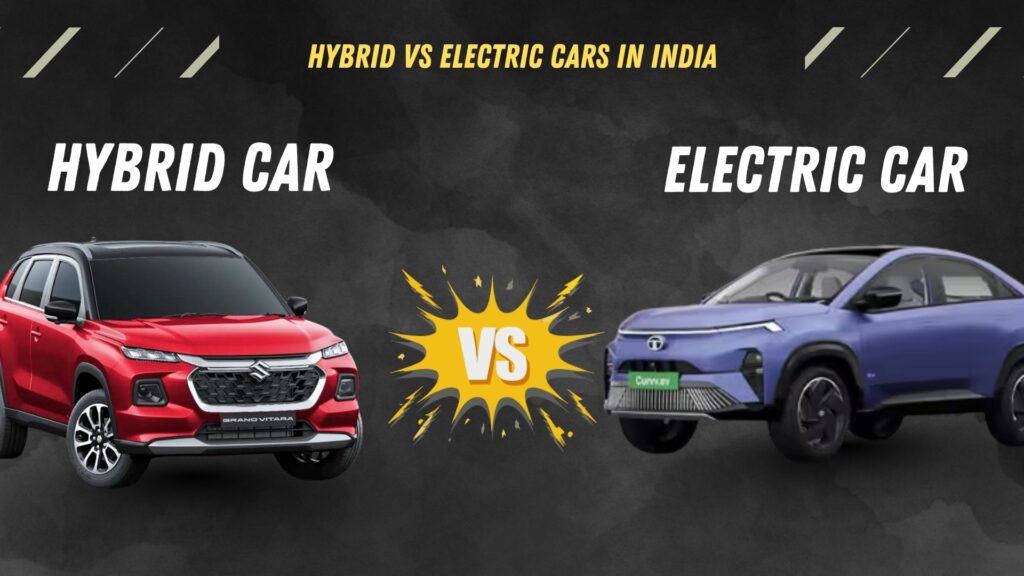Hybrid vs EV: A Deep Research Blog
Understanding Hybrid Cars vs Electric Vehicles (EVs)
Hybrid cars and electric vehicles (EVs) are both cleaner alternatives to traditional petrol/diesel vehicles, but they differ fundamentally in how they are powered, how you use them, and what kind of batteries they use.
1. How Hybrids and EVs Work: The Basics
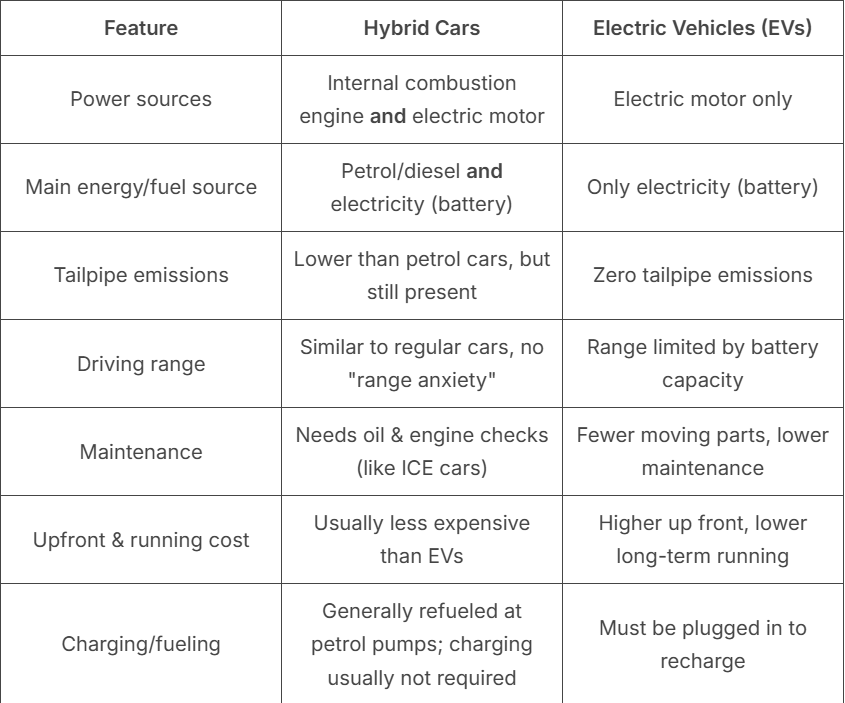
2. Do Hybrid Cars Have Lithium Batteries?
- Hybrid Battery Types:
Hybrid cars can use lithium-ion (Li-ion) or nickel-metal hydride (NiMH) batteries. Which battery is used depends on the model and manufacturer:
- Modern hybrids (e.g., Toyota Hyryder, Honda City e:HEV, recent Hyundai/Kia models) increasingly use lithium-ion batteries for better energy density, faster charging/discharging, and lighter weight.
- Older hybrids and some budget models still use NiMH packs due to cost and durability. NiMH is heavier/less energy dense but robust in extreme Indian climates.
- Plug-in Hybrid Electric Vehicles (PHEVs) almost always use lithium-ion packs, as they need more storage for longer pure-electric driving.
- Summary: Today, many hybrids have lithium batteries, but NiMH is still common in the industry.
- Modern hybrids (e.g., Toyota Hyryder, Honda City e:HEV, recent Hyundai/Kia models) increasingly use lithium-ion batteries for better energy density, faster charging/discharging, and lighter weight.
3. Do Hybrid Cars Need to Be Plugged In to Charge?
- Traditional hybrids:
- Do NOT need external charging.
- Their batteries are charged internally:
- When the engine runs — part of the engine’s power is used to recharge the battery.
- Regenerative braking — when you brake, the car recovers energy and stores it in the battery.
- When the engine runs — part of the engine’s power is used to recharge the battery.
- You never need to plug these hybrids into a socket. These are also called “self-charging hybrids.”
- Do NOT need external charging.
- Plug-In Hybrids (PHEV):
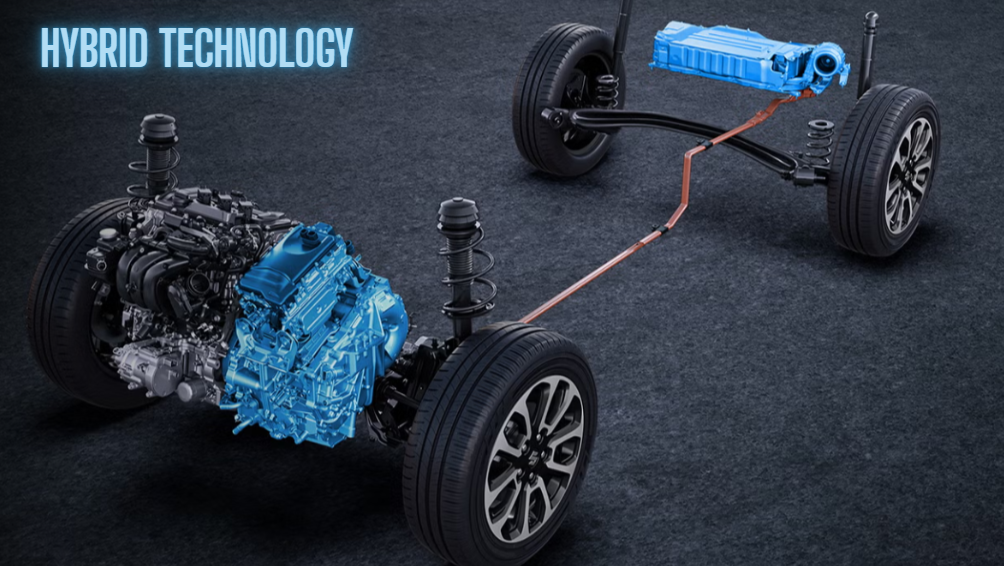
- Can and should be plugged in for charging to maximize benefits—these models have larger batteries for driving 30–80km in pure EV mode.
- If you don’t plug them in, they operate like a regular hybrid, but you won’t get their full fuel/electricity savings.
- PHEVs are less common in India, but some models are now available.
- Electric Vehicles (EVs):
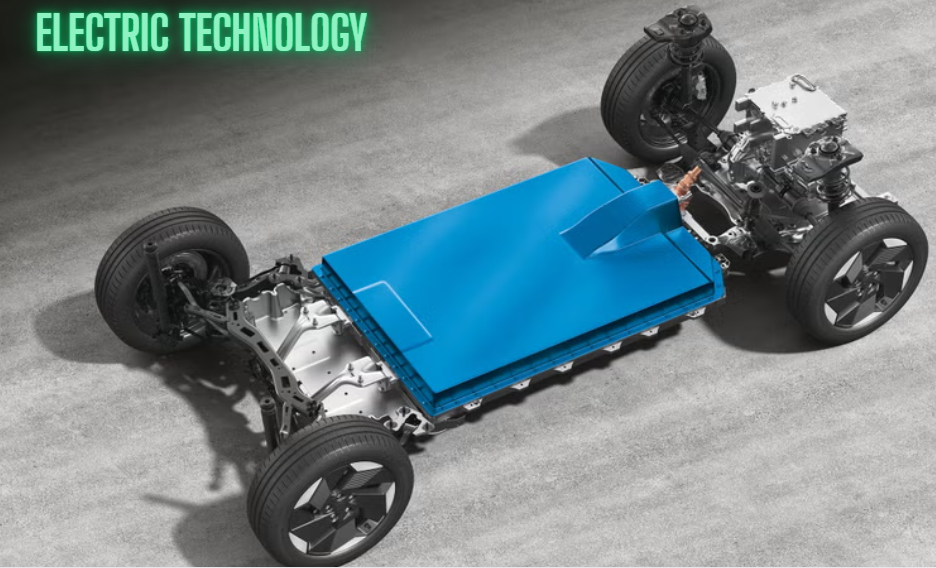
- Must be plugged into an electric outlet or charging station to restore the battery — no engine backup.
Quick FAQ
- Q: Are all hybrid car batteries lithium-based?
A: No. Many new hybrids use lithium-ion, but others (especially older models or budget trims) still use NiMH. - Q: Do I ever need to charge a non-plug-in hybrid at home?
A: No, regular hybrids recharge automatically from the engine and when you brake. Only plug-in hybrids (PHEVs) and EVs need to be plugged in.
Pros and Cons: Hybrid vs EV
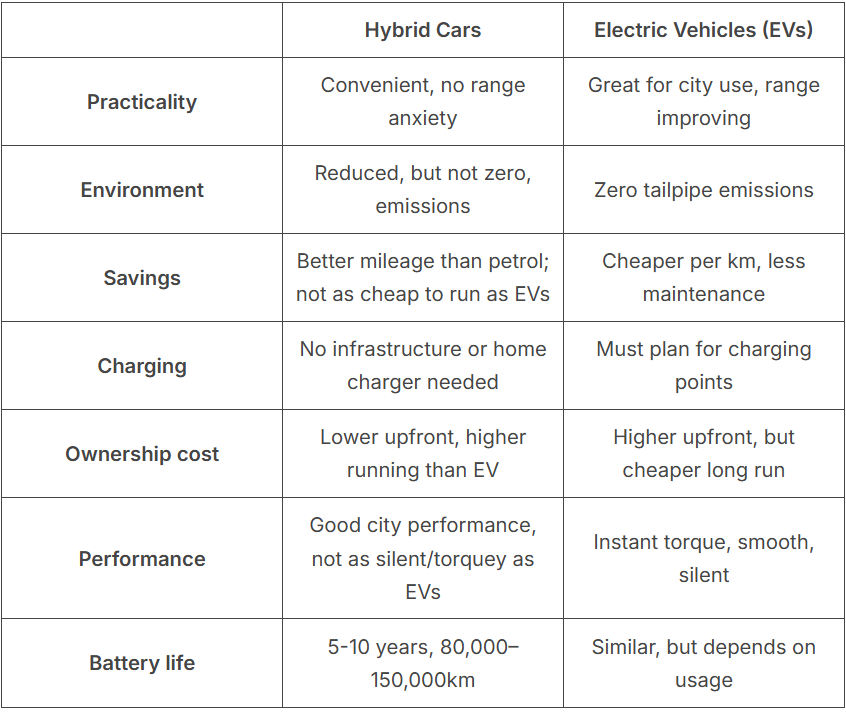
Indian Market Considerations
- Hybrids are superb for mixed-use (city + highway), need no charging setup at home, and are worry-free for long journeys.
- EVs are ideal for city drivers with access to charging and looking for lowest running costs and zero emissions.
- Plug-in hybrids are rare in India but combine both worlds if you want short electric commutes and engine backup for long trips.
Final Takeaway
- Hybrids: Use both petrol and electricity. Batteries can be lithium-ion or NiMH. Only plug-in hybrids need external charging—most recharge automatically when you drive and brake.
- EVs: Use only electricity. Always need to be plugged in to charge. Batteries are always lithium-ion.
Cost Comparison: Hybrid vs EV
Upfront Price
- Hybrids: Generally, hybrid cars are priced higher than standard petrol cars but cheaper than most mainstream EVs. In India, 2025 models like the Toyota Hyryder, Honda City Hybrid, and Maruti Grand Vitara Hybrid typically start at around ₹15 lakh and can go up to ₹30 lakh, depending on features and brand.
- EVs: The initial cost for electric cars is higher because of the expensive battery technology. Entry-level EVs start at about ₹12 lakh, but most popular and feature-rich models run between ₹18–35 lakh or more. Premium EVs (like Mahindra BE 6,BE 9E, BYD e6) can go even higher.
Running Cost
- EVs: They win hands down on per-kilometre running cost—typically ₹1–2/km, thanks to much cheaper electricity compared to petrol.
- Hybrids: Have much better mileage (22–27km/l or even more), but petrol is far costlier per unit of energy. The typical hybrid’s running cost is ₹5–7/km.
Maintenance
- EVs: Fewer moving parts, no oil changes, less regular servicing needed, so maintenance is lighter and cheaper in the long term.
- Hybrids: Slightly more maintenance than EVs due to the petrol engine but still much lower than regular petrol/diesel cars due to less engine usage and regenerative braking reducing wear.
Long-Term Ownership
- EVs are the most economical if you keep your car for several years and drive regularly, as low running and maintenance costs make up for the higher initial price.
- Hybrids are easier to buy now (lower price, no charging hassle) but may not be cheaper over 5–7 years if driven extensively.
Why Do Hybrids Exist? Why Do They Make Sense?
The Concept of Hybrid Cars:
- Hybrids are designed as a bridge between traditional petrol/diesel cars and full EVs.
- They combine a regular engine with an electric motor and a battery that charges automatically (regenerative braking and engine power—no plug needed), allowing for lower emissions and improved mileage without range anxiety or need for a charging network.
Advantages of Hybrids
- No Charging Dependence: Great for users who don’t have easy access to home or public charging, or who routinely travel beyond city charging networks.
- Long Range & Quick Refueling: Typically 800–1,000km on a full tank, with refueling just as quick as a petrol/diesel car—EVs currently do not match this unless you invest in the most expensive models.
- Fuel Efficiency: Real-world Indian driving (traffic, highway and city mix) favors hybrids thanks to the electric motor’s work at low speeds and in stop-and-go traffic, leading to much higher efficiency over regular ICE cars.
- Lower Emissions: Substantially lower than standard petrol/diesel cars (but not as clean as a true EV).
- Smoother Transition: The driving experience is familiar for those used to petrol cars—no anxiety about range or finding the next charging station.
Why Are Hybrids Needed?
- Charging Infrastructure Gaps: India (and much of the world) still lacks comprehensive, reliable fast-charging networks, especially outside major cities. Hybrids allow drivers to benefit from EV-like efficiency without being dependent on chargers.
- Affordability: Many buyers are price-sensitive—the gap between ICE/hybrid and EV is closing but persists, and government incentives are still mostly tilted toward EVs.
- Practicality: For long trips, rural driving, or areas without reliable charging, hybrids are still the most practical green option
Things to Note :
You do not need to manually switch between petrol and battery (electric) mode in a typical hybrid car.
The transition between the petrol engine and the electric motor (and sometimes a combination of both) happens automatically based on driving conditions. The car’s computer determines when to use each power source for maximum efficiency, performance, and minimal emissions.
Here’s how it works:
- At low speeds or when idling (such as in slow traffic), the car will often use the electric motor alone.
- During acceleration or higher speeds, the petrol engine may start automatically to provide extra power.
- The system constantly and seamlessly switches between petrol, electric, or both, without you having to do anything.
- The only exception is in some plug-in hybrids (PHEVs), where you may find a selectable “EV Mode” button to force the car to use only stored battery power for as long as it lasts—but even there, the system will revert to petrol power automatically once the battery is depleted.
In summary:
With standard hybrid cars in India and globally, the management between battery and petrol power is automatic. There is no manual switch required for regular driving. Just drive as you normally would; the advanced hybrid system does all the work for you.
Key Takeaways
- Hybrid is not always costlier than EV. In fact, most hybrids are cheaper to buy than EVs in 2025 (in India), but costlier to run—EVs win long-term if you drive a lot and have access to charging.
- Hybrids don’t need charging; they use the engine and braking to keep the battery topped up, making them ideal for users not ready for the plug-in future.
- The value of hybrids lies in their blend of familiar usage (like ICE cars) and major improvements in efficiency and emissions—making them a great transition option for both Indian and global markets on the road to universal electric mobility.
In short: Hybrids make sense if you want better mileage and lower emissions but aren’t ready for full electric cars (due to cost, charging, or usage patterns). They’re not always more expensive than EVs—the price, running cost, and practicality all depend on your needs and driving style.
Disclaimer: Prices, specifications, mileage figures and feature lists cited in this article are based on publicly available information as of July 2025 and may change without notice. Always confirm the latest details with authorised dealers or the manufacturer before making a purchase decision. This content is for general informational purposes only and should not be taken as financial, technical or legal advice. Neither the author nor this website assumes any liability for actions taken based on the information provided.
Mileage Disclaimer: All mileage figures mentioned in this article, including ARAI-certified and real-world fuel efficiency numbers, are indicative and may vary significantly based on actual driving conditions, rider weight, vehicle maintenance, road conditions, traffic patterns, riding style, fuel quality, weather conditions, and individual vehicle variations. ARAI (Automotive Research Association of India) test figures are obtained under controlled laboratory conditions and may not reflect real-world performance. Actual mileage typically ranges 10-30% lower than ARAI figures depending on usage patterns. Urban city riding generally delivers lower mileage compared to highway cruising at optimal speeds. Regular maintenance, proper tire pressure, quality fuel, and smooth riding techniques can help achieve better fuel efficiency. The mileage figures quoted from user reviews and owner reports represent individual experiences and should not be considered as guaranteed performance standards. Always test ride with a helmet and evaluate real-world performance before making a purchase decision.
References :
- https://www.hybridautomotives.com.au/do-hybrid-cars-have-lithium-batteries/
- https://www.exclusivelyhybrid.com/hybrid-battery-guide/
- https://www.mitsubishi-motors.ca/en/milife/hybrid-car-battery-101–how-it-works—how-long-it-lasts
- https://www.reddit.com/r/batteries/comments/1b3gp3e/why_do_some_hybrid_cars_still_use_nimh_chemistry/
- https://afdc.energy.gov/vehicles/electric-basics-hev
- https://ev-lectron.com/blogs/blog/do-you-have-to-charge-a-hybrid-everything-you-need-to-know
- https://store.autelenergy.com/blogs/blog/how-often-do-you-have-to-charge-a-hybrid-car
- https://www.trustford.co.uk/electric-and-hybrid-vehicles/electric-and-hybrid-guides/how-often-do-you-charge-an-electric-vehicle/
- https://afdc.energy.gov/vehicles/how-do-hybrid-electric-cars-work
- https://www.toyota.com.cy/electrified/hybrid/do-hybrid-cars-need-to-be-charged
- https://www.greenvehicleguide.gov.au/pages/LowAndZeroEmissionVehicles/HybridVehicleInformation
- https://e-amrit.niti.gov.in/types-of-electric-vehicles
- https://www.shankariasparliament.com/current-affairs/hybrid-vehicle-vs-electric-vehicle
- https://www.progressive.com/answers/hybrid-vs-electric-cars/
- https://www.shriramgi.com/article/electric-vs-hybrid-cars-comparison
- https://www.caranddriver.com/features/a60300121/electric-vs-hybrid-cars-pros-and-cons/
- https://www.toyota.ie/electrification/battery-electric
- https://www.team-bhp.com/news/ev-vs-hybrid-compared-which-makes-better-buy-todays-times
- https://afdc.energy.gov/vehicles/electric-batteries
- https://en.wikipedia.org/wiki/Hybrid_electric_vehicle
Other references :
- https://jhanjhar.in/hybrid-vs-ev-cars-india-2025-guide/
- https://www.91wheels.com/buyers-guide/hybrid-vs-ev-in-2025-which-one-makes-more-sense-in-india
- https://www.carwale.com/new/hybrid-cars/
- https://www.spinny.com/blog/evs-vs-strong-hybrids/
- https://www.cardekho.com/electric-cars
- https://caronphone.com/blog/ev-vs-hybrid-vs-cng-cars-in-india-which-car-is-cheapest-to-run/
- https://www.shriramgi.com/article/electric-vs-hybrid-cars-comparison
- https://www.solarreviews.com/blog/hybrids-versus-electric-cars
- https://www.greencars.com/greencars-101/benefits-of-hybrid-electric-vehicles
- https://www.seat.com/hybrid-cars/advantages-of-hybrid-cars
- https://www.caranddriver.com/features/a60300121/electric-vs-hybrid-cars-pros-and-cons/
- https://www.ayvens.com/en-in/about-us/blog/trends/how-hybrid-cars-work-india/
- https://www.mgmotor.co.in/blogs/hybrid-vs-electric-which-is-the-right-fit-for-you
- https://pod-point.com/guides/should-i-get-a-hybrid-or-an-ev
- https://www.iffcotokio.co.in/blog/car-insurance/petrol-diesel-hybrid-cng-or-ev-which-car-should-you-buy
- https://www.upes.ac.in/blog/advanced-engineering/ev-vs-hybrid-benefits-and-disadvantages
- https://ioagpl.com/cng-car-vs-electric-car/
- https://www.pendlelease.co.uk/news/5-advantages-and-disadvantages-of-hybrid-cars
- https://www.team-bhp.com/news/ev-vs-hybrid-compared-which-makes-better-buy-todays-times
- https://www.indiatoday.in/auto/cars/story/electric-cars-vs-hybrids-what-will-buyers-opt-for-in-2025-2681336-2025-02-17

